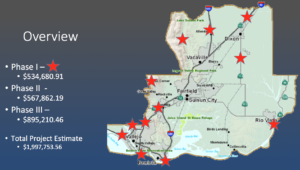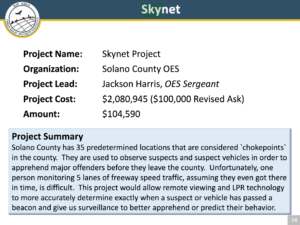With a nod to Terminator’s self-aware computer network, the Solano County Sheriff in Northern California has applied for and received partial funding for Project Skynet, a network of surveillance cameras and automated license plate readers (ALPRs). Project Skynet would install 160 ALPRs and 124 surveillance cameras at 66 locations throughout Solano County. In its response to a request for public records, Daniel Wolk, Deputy County Counsel for Solano County noted, “this is at the proposal stage and specifics, including camera locations, have not been decided upon.”

Map of Phase I Camera/ALPR Locations
Like the ring of stationary ALPRs around the City of Piedmont, the goal of the project is to capture images and video of all vehicles entering and exiting Solano County. According to a Microsoft PowerPoint presentation prepared by the Solano County Sheriff’s Office, the surveillance cameras would be capable of pan-tilt-zoom and data from the ALPRs and cameras would allow “real time information or years of past history.” The UASI grant application states, “In addition to the direct connection this project has with observing and locating terrorists, it also allows law enforcement to monitor human trafficking. I-80 is a major artery for drugs and human trafficking which are major funding sources for terrorism, from the west coast to the east.”
As with all grant applications to the Urban Areas Security Initiative, the project must have a nexus to terrorism. In its proposal for a Homeland Security Grant, the Solano County Sheriff writes, “We will be able to…locate persons and vehicles associated with terrorist threats, disrupt terrorist financing…” However, given that terrorism is extremely rare, this surveillance network is more likely to be used against pedestrian suspected criminal activity.
The PowerPoint document states, “There are 36 (666) locations, many of which are large freeways and near impossible to watch at once.” “666” is a police code for a county-wide emergency or be-on-the-lookout (BOLO). However, the grant application and approval documents cite 35 locations.
On July 13, 2017, the Bay Area Urban Areas Security Initiative (UASI) Approval Authority approved funding of $104,590 towards the $2 million total cost of Project Skynet.

Bay Area UASI Approval slide
The estimated $2 million cost for Project Skynet is broken down into phases with an estimated cost of $535,000 for Phase I, $568,000 for Phase II, and $895,000 for Phase III. Data from the ALPRs would be stored at the Northern California Regional Intelligence Center (NCRIC), the local joint fusion center that shares license plate reader data with dozens of local, state, and federal agencies.
The NCRIC stores license plate reader data for dozens of local law enforcement agencies and as of April 2015, stored 46.5 million records, which includes license plates and photographs of vehicles, including the occupants and surrounding area with geolocation data.
[…] plate readers) and 124 surveillance cameras at 66 locations throughout Solano County.” https://www.cehrp.org/solano-county-sheriff-gets-initial-funding-for-project-skynet/ “Skynet” was the rogue artificial intelligence that attempted to destroy humanity, […]
Really awesome we’re spending money on big brother projects instead of..I don’t know, helping the poor or fixing roads.